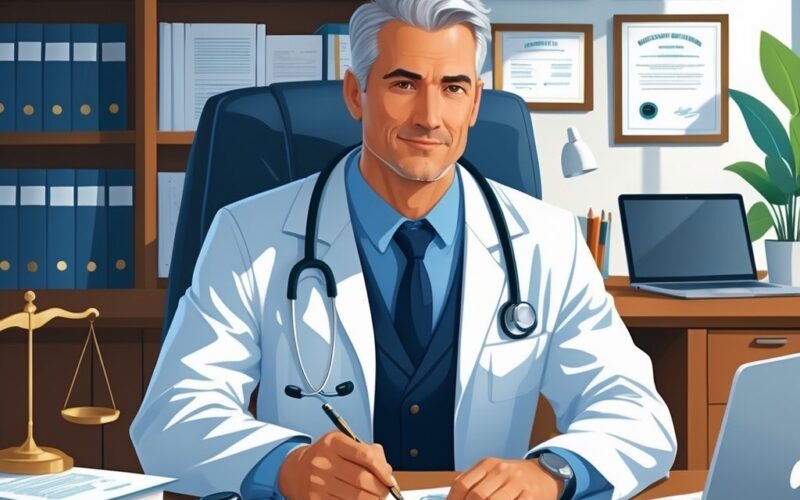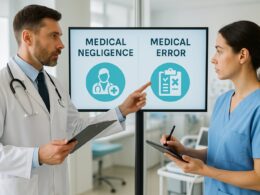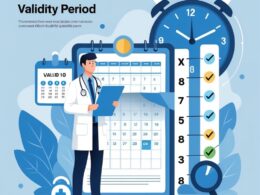When you’re tangled up in a legal case with medical questions, you need someone who can connect the dots between medicine and law.
A medical legal expert is a healthcare professional who offers specialized knowledge and testimony to help courts understand complicated medical issues in legal battles. These experts show up in cases from personal injury claims to medical malpractice lawsuits.
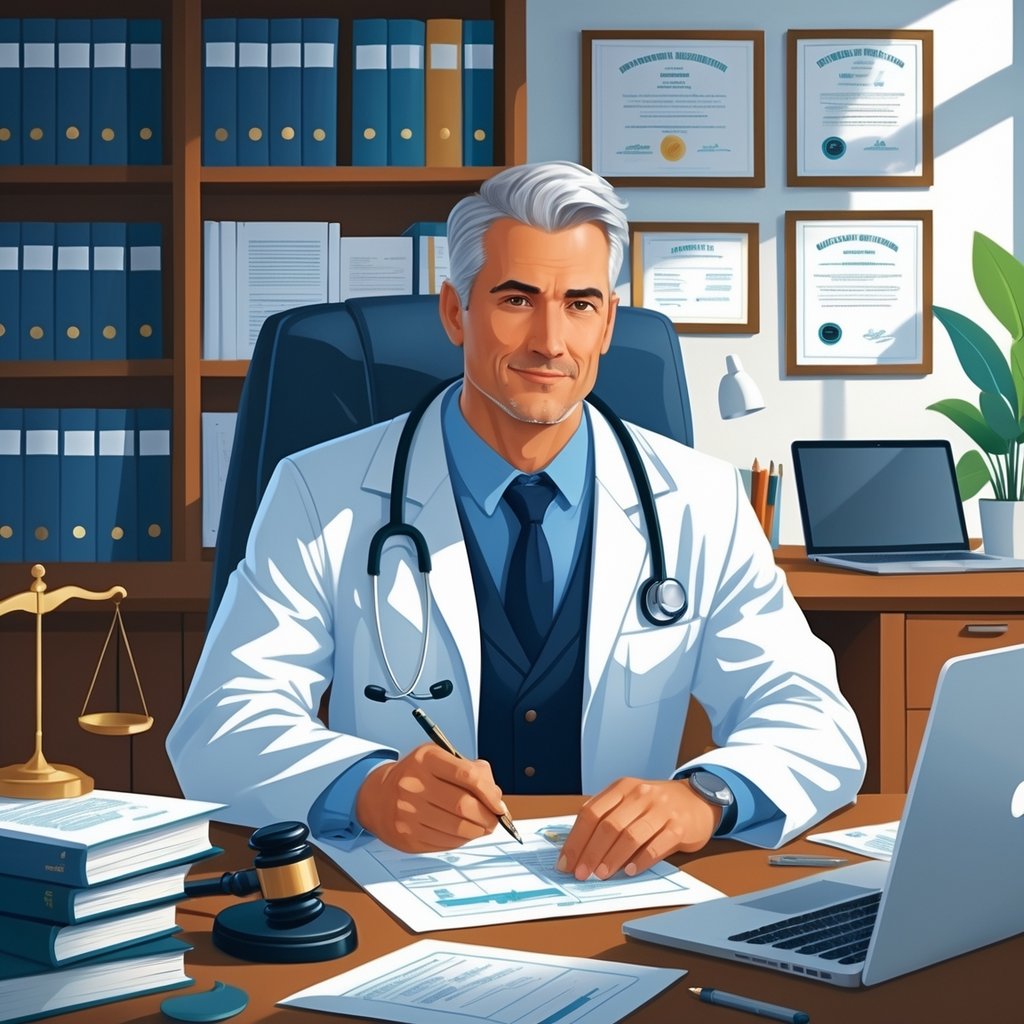
Medical legal experts might be doctors, nurses, or other healthcare professionals who have learned to analyze medical evidence for legal needs.
They review medical records, examine patients, and break down tough medical information so judges and juries can actually get it.
Their work can tip the balance in legal cases because they give objective, evidence-based opinions.
The field of medico-legal expertise requires specific qualifications built on years of clinical experience.
If you’re dealing with a workplace injury, car accident, or medical negligence, knowing what these professionals do can make the legal maze less confusing.
Key Takeaways
- Medical legal experts are healthcare pros who provide specialized testimony and analysis in legal cases with medical questions
- They review medical evidence and translate complicated information into plain language for courts and legal teams
- Qualifications and roles vary based on their clinical experience and the type of legal case
Medical Legal Expert Defined
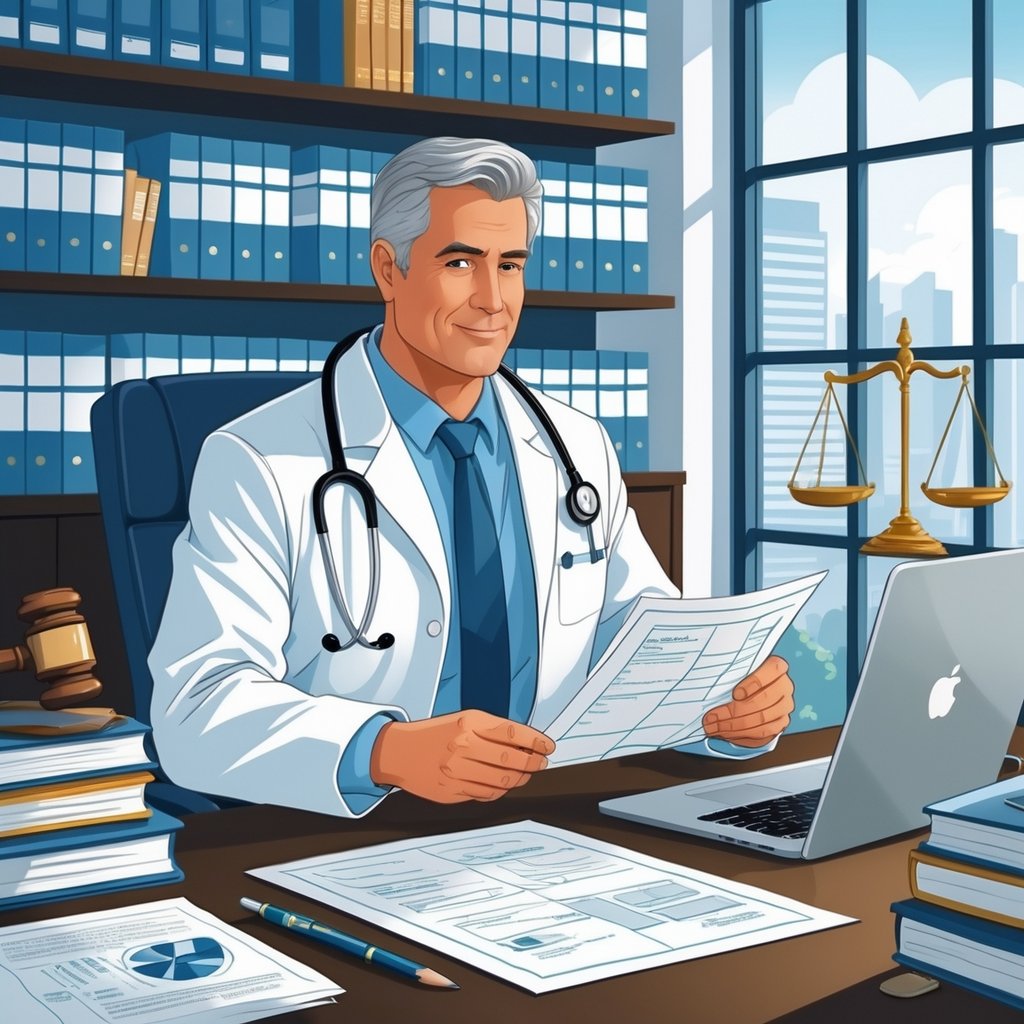
A medical legal expert is a healthcare professional who uses their clinical background to analyze medical evidence and give professional opinions in legal settings.
They bridge the gap between tough medical concepts and what the law needs, thanks to their mix of clinical know-how and legal training.
What Sets a Medical Legal Expert Apart From Other Experts
Medical legal experts stand out because they’ve got both clinical experience and legal knowledge.
Regular doctors focus on patient care. Medical legal experts, though, understand court procedures and legal standards too.
Your average doctor might have great clinical skills.
But a medical legal expert can explain complicated medical stuff in plain English for judges and juries.
They know their way around legal terms and what courts expect.
Key Differences Include:
- Neutral stance: Medical legal experts stay impartial, while treating doctors advocate for their patients
- Report writing skills: They create detailed, legally compliant reports that follow court formats
- Cross-examination training: These experts can handle tough questions from the other side’s attorneys
- Legal knowledge: They get evidence rules, disclosure, and what expert witnesses are supposed to do
Medical expert witnesses base their opinions on facts and evidence.
They can’t show bias for either side.
Their testimony carries a lot of weight because courts see their knowledge as going way beyond the average medical professional.
Qualifications and Credentials Required
Medical legal experts need more than just basic medical training.
You have to hold an active medical license and stay in good standing with your regulatory board.
Essential Requirements:
| Credential | Purpose |
|---|---|
| Medical degree | Foundation of medical knowledge |
| Board certification | Specialty expertise verification |
| Active license | Legal authority to practice |
| Expert witness training | Court procedure knowledge |
| Professional insurance | Protection against liability |
Most medical legal experts rack up 10 to 15 years of clinical experience before diving into legal work.
This background helps them evaluate tough cases with confidence.
Specialized training in legal procedures is a must.
You need to know Civil Procedure Rules, evidence standards, and what’s expected from an expert witness.
Additional Qualifications:
- Membership in professional expert witness groups
- Continuing education in both medicine and law
- Clean record with medical boards
- Strong written and verbal communication skills
Many also take courses in medical jurisprudence, learning about the overlap of medicine and law, including ethics and legal responsibilities.
Core Roles and Responsibilities
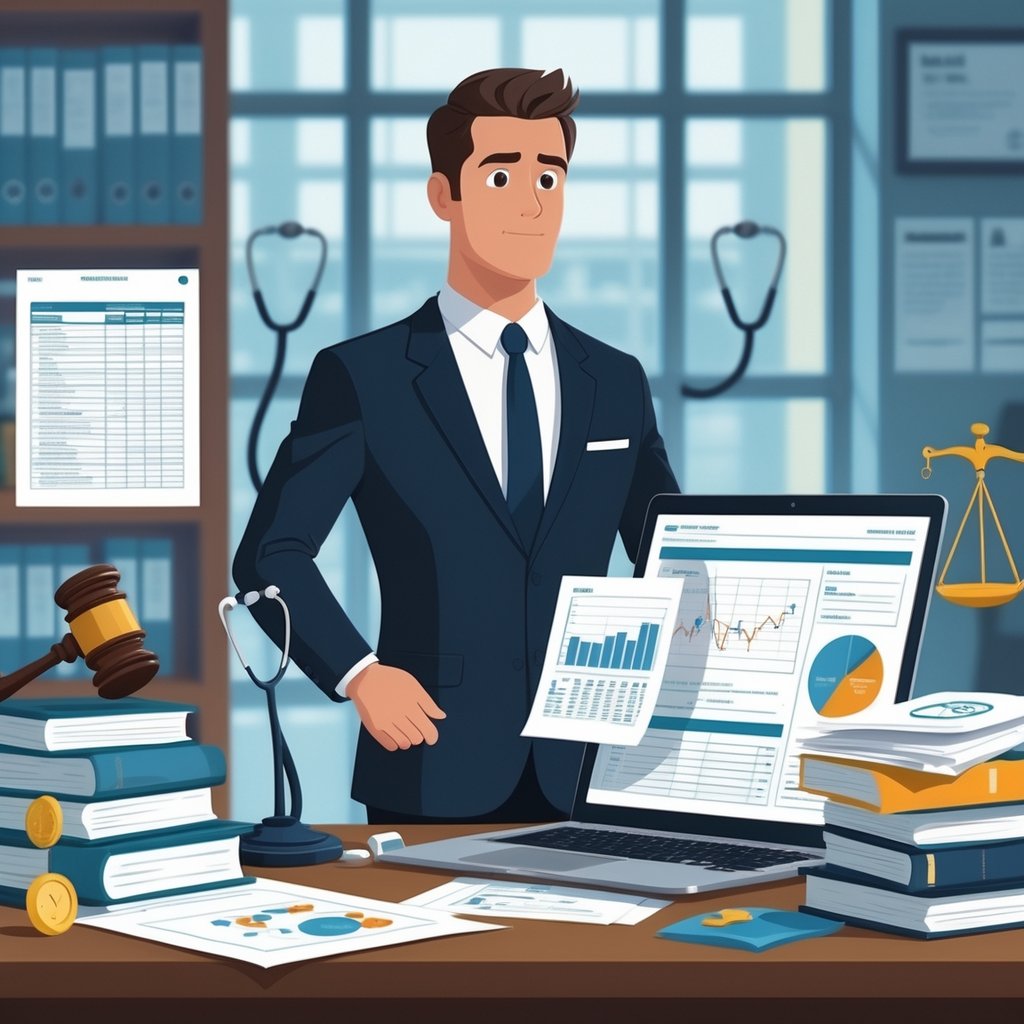
Medical legal experts give expert opinion and testimony in court, review complicated medical records, and decide if healthcare providers met accepted standards of care.
These responsibilities are at the heart of what they do.
Expert Opinion in Legal Cases
Your main job as a medical legal expert is to give professional opinions and testify in court.
You help judges and juries make sense of complicated medical topics that are central to the case.
Key testimony responsibilities include:
- Explaining medical procedures in plain language
- Interpreting diagnostic test results
- Clarifying treatment choices and outcomes
- Answering questions during depositions
During depositions, you give sworn testimony before the trial.
Attorneys use these sessions to understand your opinions and get ready for court.
You have to stay objective and unbiased.
Your opinions come from medical facts and evidence, not from whoever hired you.
Expert witness testimony is essential in medical malpractice cases.
Without your expertise, laypeople would have a hard time understanding the details of medical care.
You turn complicated medical jargon into language that legal professionals and jurors can actually follow.
That communication skill is a big deal.
Preparation and Review of Medical Records
You’ll spend a lot of time going through and analyzing medical records before you give any opinions.
This careful review is the backbone of your expert testimony.
Your record review process usually includes:
- Patient charts and treatment notes
- Diagnostic imaging and test results
- Medication records
- Surgery reports and operative notes
You look for patterns in care, treatment decisions, and how patients responded.
These details help you form your professional opinions.
Medical records sometimes have gaps or unclear notes.
You point these out and explain how they affect your analysis.
You also check out medical literature and clinical guidelines.
This research helps you make sure your opinions match up with current standards and best practices.
During depositions, attorneys will ask you about specific entries in the records.
You need to be ready to explain any document in detail.
Assessing Standard of Care
You check if healthcare providers met the accepted standard of care in their decisions.
This is often the key question in medical malpractice cases.
Standard of care evaluation involves:
- Comparing what actually happened to accepted medical practices
- Reviewing clinical guidelines
- Considering what a reasonable doctor would do
- Looking at timing and choices in treatment
Medical malpractice is defined as any act or omission that strays from accepted norms and harms the patient.
You figure out if that happened.
You consider what medical knowledge was available at the time.
Standards change, so you judge care based on what was known then.
Some mistakes are obvious, like operating on the wrong body part.
Others need a deep dive into complex decisions and if they made sense.
You have to be fair and objective, pointing out both good and bad aspects of the care, no matter who hired you.
Types of Legal Cases Involving Medical Legal Experts
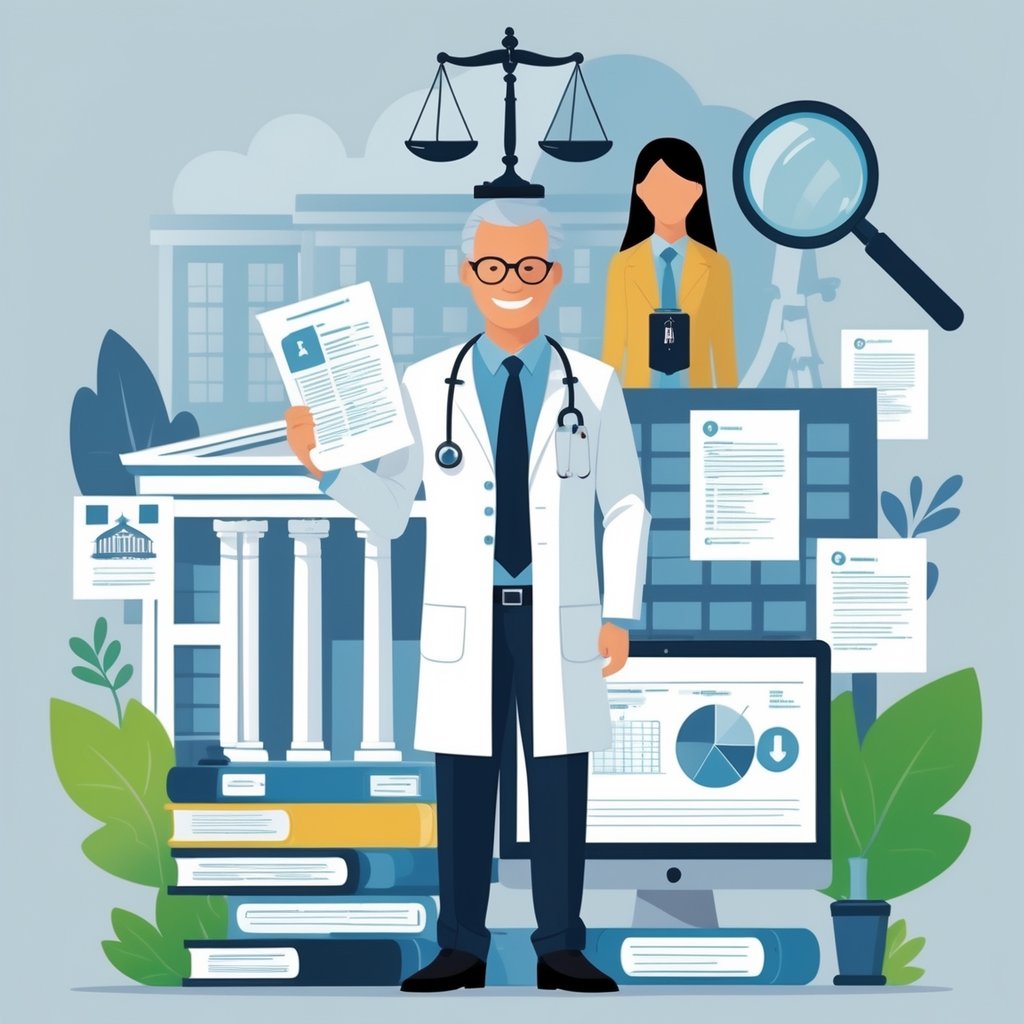
Medical legal experts bring their knowledge to four main types of legal fights.
They help courts make sense of medical issues in malpractice cases, injury claims, workplace compensation disputes, and product-related health problems.
Medical Malpractice Litigation
Medical malpractice cases need expert witnesses to figure out if healthcare providers met accepted standards.
These experts review records, treatment plans, and patient outcomes to spot any negligence.
Key responsibilities include:
- Analyzing treatment decisions and procedures
- Spotting deviations from standard care
- Explaining tricky medical concepts to juries
- Figuring out damages tied to ongoing medical needs
Medical malpractice litigation often brings in more than one expert because medical procedures can get complicated.
Surgical mistakes, misdiagnosis, and medication errors are common issues.
Your expert witness should have credentials in the right specialty.
They need current medical practice and board certification.
The expert’s testimony can make or break a case.
They have to explain clearly how the defendant’s actions fell short and caused harm.
Personal Injury Claims
Personal injury cases often call for medical experts to show how bad the injuries are and what the long-term effects might be.
These professionals assess trauma from accidents, treatment needs, and disability levels.
Common personal injury scenarios include:
- Car accidents with serious injuries
- Slip and fall cases with fractures
- Sports concussions and brain injuries
- Construction accidents with multiple traumas
Medical experts in personal injury claims figure out if the accident really caused the injuries.
They also separate pre-existing conditions from new problems.
Your expert witness adds up future medical costs and care needs.
They estimate rehab, assistive devices, and ongoing treatments.
Medical testimony helps set fair compensation.
Experts explain how injuries impact daily life, work, and overall well-being.
Workers’ Compensation and Disability Evaluations
Workers’ compensation cases depend on medical experts to decide if injuries or illnesses are work-related.
These evaluations affect if someone gets benefits and when they can return to work.
Expert evaluations cover:
- Occupational disease causes
- How severe workplace injuries are
- Functional capacity evaluations
- Maximum medical improvement decisions
Medical experts in workers’ comp cases need to know clinical medicine and occupational health.
They figure out how job conditions contributed to health problems.
Disability claims require experts to assess limitations and work restrictions.
They decide the percentage of disability and what accommodations are needed.
Your expert reviews job descriptions, workplace hazards, and medical evidence.
They offer objective opinions on work capacity and limitations.
Independent medical exams often settle disputed workers’ comp claims.
These exams give neutral opinions for resolving claims.
Product Liability and Forensic Medicine Applications
Product liability cases involving medical devices, medications, or consumer products need medical experts.
These professionals analyze how faulty products caused injuries or health issues.
Forensic medicine applications include:
- Medical device failure analysis
- Drug side effect evaluations
- Toxic exposure reviews
- Consumer product safety checks
Medical experts in product liability cases need to know both clinical effects and product design.
They connect product defects to specific health outcomes.
Pharmaceutical lawsuits need experts who understand drug interactions, side effects, and regulations.
They check if manufacturers warned people properly about risks.
Your forensic medicine expert looks at medical literature, clinical trials, and safety data.
They decide if products met safety standards and caused injuries.
A lot of these cases involve many plaintiffs with similar problems.
Medical experts help show patterns of harm across groups.
Processes and Procedures
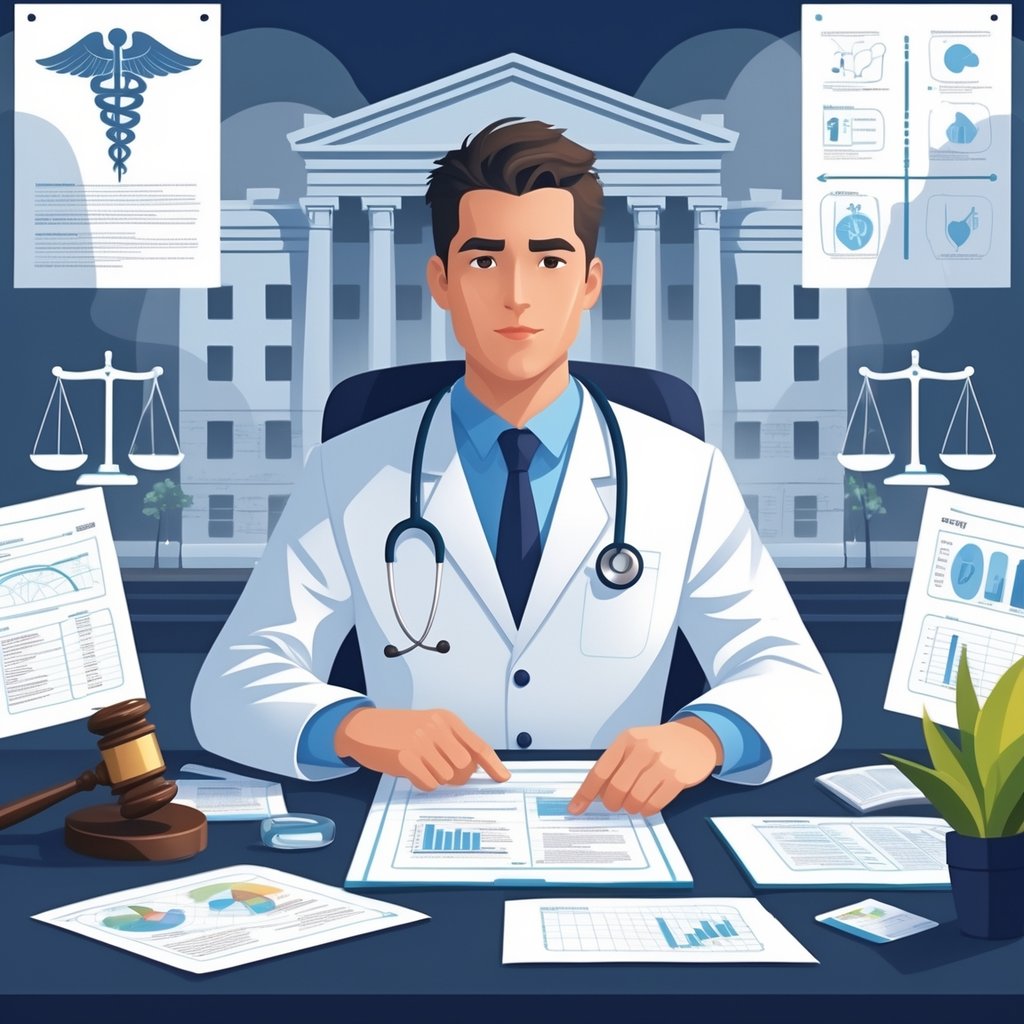
Medical legal experts follow a set process when examining patients and sharing findings in court.
They conduct thorough examinations and provide clear testimony under oath.
Independent Medical Examinations (IME)
An IME is a medical exam done by a doctor who hasn’t treated you before. This happens when there are questions about your injuries or medical condition in a legal case.
Purpose of IME:
- Assess your current medical condition
- Review your medical history
- Decide if your injuries connect to the incident
- Evaluate if you need future treatment
The medical expert acts as a subject matter expert and gives a specialized opinion. During the IME, the doctor examines you and reviews your medical records.
What to Expect:
- Physical exam lasting 30 to 90 minutes
- Questions about your symptoms and pain
- Review of X-rays, MRIs, and other tests
- Discussion about how injuries affect your daily life
The doctor writes a detailed report after your exam. This report goes into your legal case and helps decide compensation or treatment.
Depositions and Testimony in Court
A deposition means you answer questions under oath before trial. Expert witness coordination helps attorneys prepare medical experts for deposition or trial.
Deposition Process:
- You swear to tell the truth
- Lawyers ask questions about your condition
- A court reporter records everything
- Your answers become legal testimony
Medical experts break down complex medical terms into simple language during depositions. They stick to facts from records and exams.
Court Testimony Requirements:
- Speak clearly and directly
- Only answer what is asked
- Admit when you don’t know something
- Use plain language, not medical jargon
The expert’s testimony can shape your case. They must stay neutral and base opinions on medical evidence, not personal feelings.
Selecting the Right Medical Legal Expert
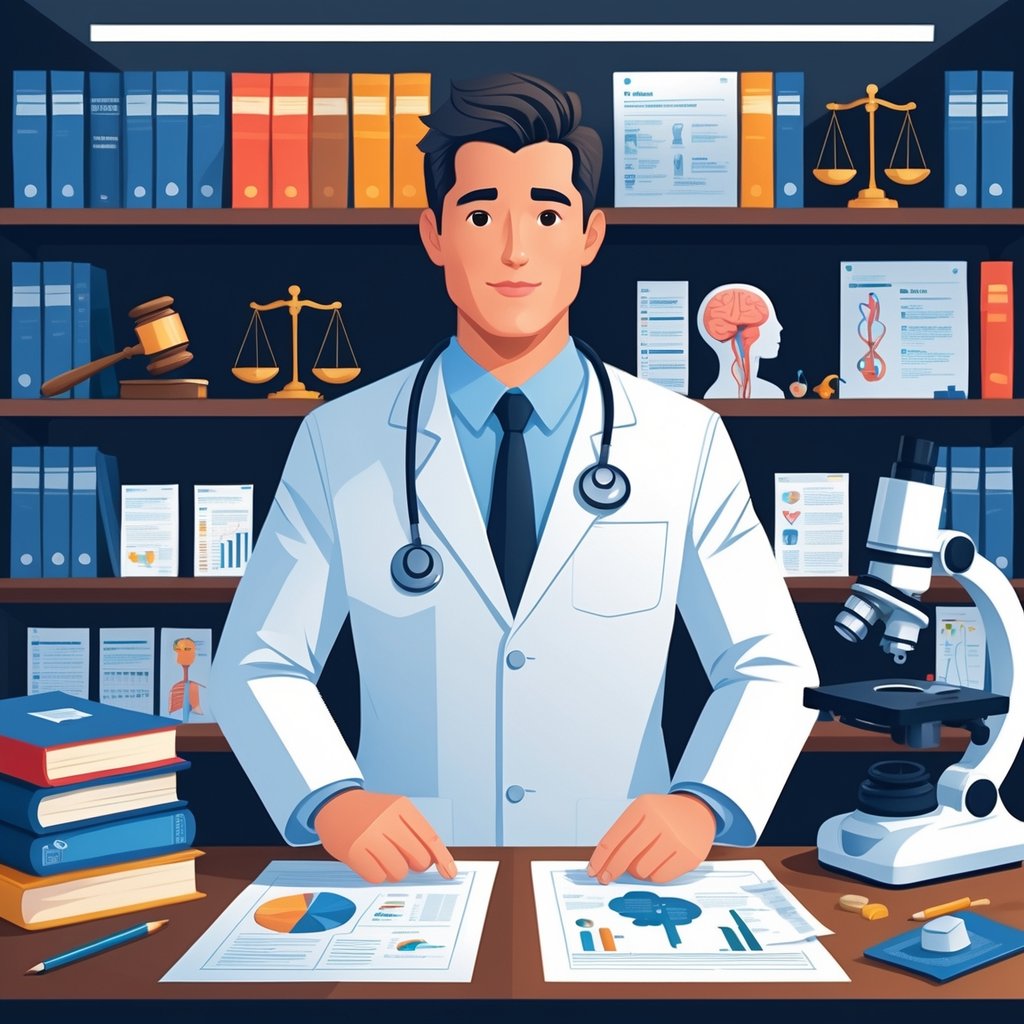
Choosing the right medical legal expert takes some careful thought. Your case can hinge on finding someone who gets the medical issues and can explain them in plain English to judges and juries.
Evaluating Expertise and Specialty
Match the Expert to Your Case Type
Find an expert with experience related to your case. If your case involves heart surgery, you want a cardiac surgeon. For bone injuries, go for an orthopedic specialist.
Check Their Background
Look at these key areas:
- Board certifications in the right field
- Years of practice in their specialty
- Experience as an expert witness
- Published research or articles
Verify Active Practice
Pick experts who still work in their field. Doctors who see patients now know current standards better than retired ones.
Review Past Testimony
Medical expert witnesses with courtroom experience know the ropes. Ask about their past cases and how those went.
Assessing Communication and Impartiality
Test Explanation Skills
Your expert has to explain medical terms simply. Juries can’t decide if they don’t get the basics.
Set up a short interview to see how they talk about medical issues. Good experts use real-life examples and skip the jargon.
Check for Bias Issues
Red flags:
- Only taking plaintiff or defense cases
- Making extreme claims about standards
- Personal ties to people in your case
- Financial interests in the outcome
Evaluate Professional Demeanor
Strong medico-legal experts stay calm and credible under pressure. Look for experts who dress sharp and speak clearly. Juries notice how an expert looks and acts.
Significance in the Legal System
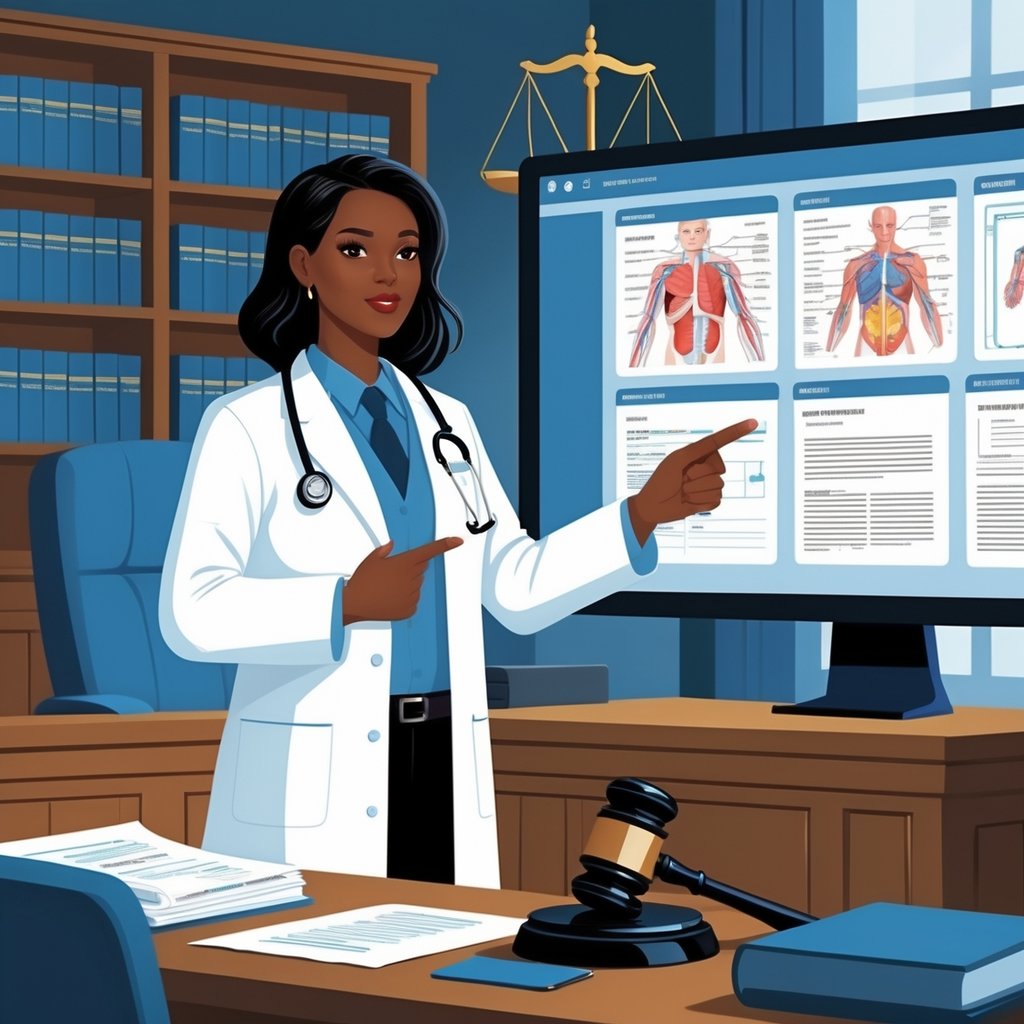
Medical legal experts can really change the course of a trial. They turn complicated medical info into testimony regular people can understand.
Impact on Legal Outcomes
Medical legal experts play a huge role in how juries decide cases. Expert witnesses often change the direction of a case just through their opinions.
Jury Perception and Credibility
Juries see medical experts as credible and authoritative. Their calm confidence and knowledge can tip the scales.
Your case can depend on how well the expert explains if medical standards were met. In malpractice claims, experts lay out what proper care looks like in real life.
Testimony Standards
Medical experts testify with “reasonable medical certainty” in court. This standard makes their opinions count in court decisions.
Medical expert witnesses help judges and juries understand tricky medical facts. How they present themselves can affect the outcome.
Bridging Medicine and Law
Medical legal experts act as translators between two complicated fields. They make medical info clear for lawyers and judges who don’t have medical backgrounds.
Simplifying Medical Complexity
These experts turn jargon into plain language. Judges and juries can then actually make sense of medical issues in a case.
Your legal team relies on experts to review records thoroughly. They spot key details that can support or challenge claims.
Educational Role in Court
Medical expert witnesses teach judges and juries about medical issues that matter for a fair decision. They explain procedures, diagnoses, and treatment standards for each case.
Experts often use visual aids and models to show medical concepts. These tools help everyone understand technical points about injuries or treatments.
The standard of care gets clearer through expert testimony. Experts explain what a reasonable doctor would do in the same situation.
Frequently Asked Questions
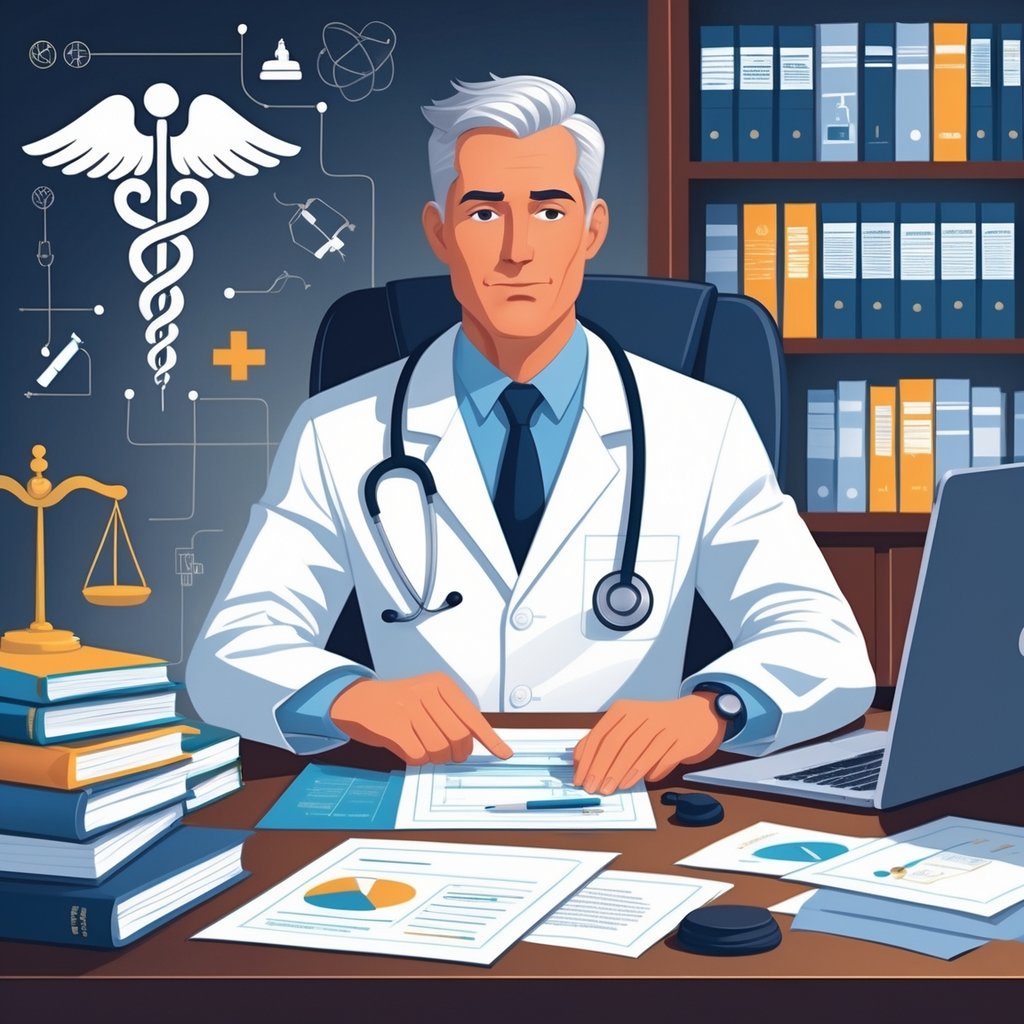
Medical expert witness work comes with specific qualifications, pay structures, and legal requirements. Knowing these details helps both new experts and legal pros handle this field.
What qualifications are required to become a medical expert witness?
You need a valid medical license in your area. GMC registration is a must for medico-legal experts in the UK.
You’ll want 5 to 10 years of clinical experience in your specialty. This background helps you connect injuries and illnesses to legal issues.
Specialized training in medical law and expert witness skills is also important. These courses cover ethics, report writing, and how to testify.
Get certified by recognized professional bodies. Joining professional panels that offer medico-legal assessments boosts your credibility.
How can one calculate the fees for medical expert witness services?
Fees depend on how complex the case is and how much time it takes. Simple reviews cost less than complicated cases.
You can charge hourly for reviewing records and writing reports. Testifying in court usually pays more per hour than office work.
Travel time and expenses get billed separately. Many experts bill portal-to-portal for depositions and court.
Rush cases come with higher fees. Same-day or fast reports can cost up to double the standard rate.
In what instances is a medical expert witness testimony considered admissible in court?
Your testimony must cover topics inside your medical expertise. Courts toss out opinions that go outside your specialty.
Your testimony should explain complex medical ideas judges and juries can’t figure out alone. Basic facts don’t need an expert.
Your opinions have to rely on solid scientific methods. Courts use admissibility rules that demand proven medical science.
Civil Procedure Rules Part 35 covers expert witness duties and report formats. Your testimony has to follow these rules.
What are the responsibilities and duties of a physician serving as an expert witness?
You must stay neutral and unbiased. Your job is to stay neutral and never pick a side.
You need to review all medical records carefully. This means checking dates, treatments, gaps, and possible mistakes.
Write clear reports. Each report explains your training, methods, and findings in plain language.
Your duty is to the court above all. If new evidence pops up, update your opinions and fix any mistakes.
What factors influence the salary range for a medical expert witness?
Your specialty affects how much you can earn. Highly specialized fields like neurosurgery or forensic psychiatry usually pay more.
Location matters a lot. Medico legal experts in London often earn more than those in small towns.
Experience matters too. Experts with strong track records can charge higher rates.
Case volume affects yearly income. Full-time experts earn more than those who take cases once in a while.
How can one locate a reputable medical expert witness within their region?
Start with professional medical organizations. They keep lists of expert witnesses sorted by specialty and location.
Legal directories also help. Some even show peer reviews and case histories.
Ask other attorneys for referrals. Colleagues usually know which experts actually deliver.
Professional panels that offer medico legal assessments keep networks of vetted experts. These panels check qualifications and experience ahead of time.






